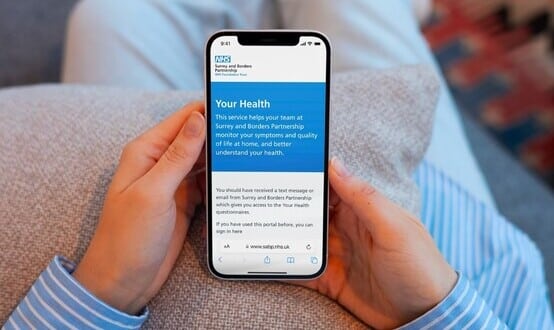Is the NHS reinforcing mental health stigma through excessive data secrecy?
- 12 April 2018

If mental health data remains more secretive than HIV, cancer or diabetes, care inequality will continue, writes Dr James Reed, consultant forensic psychiatrist and chief clinical information officer at Birmingham and Solihull Mental Health NHS Foundation Trust.
The human immunodeficiency virus (HIV), once carried a stigma with similarities to that of mental illnesses today. Not long ago, even the occurrence of a test for HIV would be kept hidden from relevant healthcare professionals and care providers.
Attitudes towards sexual health have moved on. HIV tests are now carried routinely in pregnancy, for blood donations, and in other circumstances, with important information shared with other members of the care community to help deliver the best for patients.
When treating people with mental illnesses, however, healthcare professionals are rarely in such an informed position. Information about mental health is still perceived as particularly sensitive.
Secrecy around mental health
Often people talk about mental health data in hushed tones, as if there is something special, or particularly secret about it when compared to other health information.
I recently heard a senior individual in one acute hospital talking about a new portal project, a technology designed to share information between professionals. They said: “Oh, of course, mental health diagnoses won’t be shown in the system.”
This response clearly showed that the default position for many is to assume that information concerning mental illnesses should not be shared, and this potentially puts patients with such illness at a disadvantage.
As a psychiatrist, I have always felt that treating mental health data as if it needs to be locked away in isolation is a complete contradiction to delivering equality for mental health.
Information about one’s schizophrenia or depression should in no way be seen as different, or any more sensitive or difficult as information about your HIV, cancer, or diabetes.
Information linked to outcomes
Patient privacy is central to effective care, and any sensitive patient information must only be accessed when appropriate. But when mental health is singled out with excessive secrecy, or even hidden away entirely, much worse outcomes for the patient can ensue, particularly when their problems are not understood.
Patient treatment cannot be effective if professionals don’t have access to information they need, and that inevitably leads to poorer standards of care.
All too often in mental health, we know there is useful information that could help to treat the patient we are seeing, but yet it is unobtainable. This is especially so if that patient is being treated away from their local hospital, where their information may be locked away in the confines of a single organisation.
MERIT takes the lead
Parity of esteem, or valuing mental and physical health equally, is now a national priority. But to really break down barriers, we need a societal shift to ensure availability of information needed to treat patients with mental illness becomes acceptable.
Four mental health vanguard trusts in the West Midlands, known as the Mental Health Alliance for Excellence, Resilience, Innovation and Training, or MERIT, are making important early steps towards this ambition, in a first-of-its-kind project for the NHS.
The four trusts have already begun to enable shared access to information among themselves, so that professionals can see specific but crucial information from the patient’s mental health record at time of crisis.
This will mean that patients presenting to hospitals in times of crisis will receive better informed and potentially life-saving care.
Covering a population of 3.4 million people, the trusts include Birmingham and Solihull Mental Health NHS Foundation Trust, Black Country Partnership NHS Foundation Trust, Dudley and Walsall Mental Health Partnership NHS Trust, and Coventry and Warwickshire Partnership NHS Trust.
The trusts are using InterSystems information sharing platform HealthShare in a mission to integrate real-time information from their different systems at the point of crisis. This means, for example, that if a patient from Birmingham presents in Wolverhampton, clinicians there will have an up-to-date understanding of the patient’s needs without having to repeat questions at what may be a distressing time.
MERIT will ensure that information directly relevant to the patient’s condition is immediately available, including controlled access to mental health diagnoses, treatment, risk assessment plans, names of professionals involved in care, and the patient’s crisis intervention plan.
All of this is has been made possible, in part by technology, and in part through robust local data sharing agreements, strict information governance measures, and strong audit trails.
Building trust
Our eventual vision is to provide a common mental health record across the West Midlands. This would be an enormous step forward, but starting with a clear clinical need, we are building trust together to share access to information and to start to remove gaps in mental health provision.
Expanding initiatives like this so that all healthcare professionals who need to understand a patient’s mental health needs are able to do so, will require of a great deal of trust and cultural acceptance.
We are not there yet, but the conversation continues to evolve, especially with high-profile individuals like Princes William and Harry talking openly about mental health and mental illness.
Society needs to move beyond talking about just mental wellbeing, too. Just as the conversation for HIV has now moved on, I would like to see a similar journey for schizophrenia, bipolar disorder, and other illnesses that we can successfully treat so that we can make a difference to more and more lives.
As with any sensitive data, we need to make sure it is accessed appropriately, with safeguards and audits in place. We must stop seeing mental health as a special case. There should be no shame attached.
Dr James Reed is chief clinical information officer at Birmingham and Solihull Mental Health NHS Foundation Trust.





10 Comments
There may be noticeably a bundle to learn about this. I assume you made certain good factors in features also.
I think all commenters are missing the point. It’s that people receiving MH treatment may want to keep information limited (as may physical health sufferers) whatever your right on views about equality
This is quite true, and all schemes of this kind will a means of opting out if people don’t want to take part. However, in general opt-out rates are low (around 1.5%) suggesting that the vast majority of people are happy with information being shared. I am worried that we disadvantage people with mental illness by restricting sharing of data when they do want it to be shared and it is in their best clinical interests.
The important thing is to make sure iCARE activity data is assigned to the appropriate MH pathway
Perhaps as customers of the NHS we all need to start insisting on our data being shared rather than leaving it up to them. I certainly want every care professional involved in any care I might need to have as many of the facts about me as possible, how else can I expect them to make the best care decisions, especially if I am unconscious. Let’s remove the stigma ourselves, after all isn’t the customer supposed to be king?
—-Is NHS reinforcing mental health stigma through excessive data secrecy?
NHS is not that subtle: It regularly –declares– there is a stigma to mental illnesses!
With Leeds, I’ve heard if you are working across different areas or on a more adhoc basis, you can get access to everything and the whole population of Leeds?
Hi June.
You are limited to those with whom your organisation has a legitimate relationship. Also full audit trail and investigation of irregular use. The sharing is a subset of our data which is proportionate to the needs of non-mental health users. We are slowly, cautiously creeping forward with the amount we share. It’s not whole record sharing.
Hi James. Good luck on your sharing journey. In Leeds we have been sharing Mental Health information for nearly two years now through Leeds Care Record. This includes next appointment date, contact details for involved staff and risk flags. I worried about stigma and prejudice, but in fact we think it has improved that by normalising the presence of a MH record. We have had a tiny number of opt outs and patients are pleased with the improved communication between different specialties. It’s well worth the effort!
—I worried about stigma
I am far more concerned about those who say there is one. Their voices have dominated for too long.
Comments are closed.